The Forgotten Thousands: The Historiography of World War II Rescues of Allied Airmen in Yugoslavia
The Forgotten Thousands: The Historiography of World War II Rescues of Allied Airmen in Yugoslavia
Author(s): Robert J. Donia
Subject(s): Military history, WW II and following years (1940 - 1949), Politics of History/Memory, Peace and Conflict Studies
Published by: Akademija Nauka i Umjetnosti Bosne i Hercegovine
Keywords: Operation Halyard; World War II; Allied Air Rescue Operations; Chetniks; Partisans; Yugoslavia; Pranjani;
Summary/Abstract: During World War II, Allied bombing of German-controlled petroleum refineries in Ploesti, Romania, diminished Axis fuel production but cost the Allies hundreds of planes and thousands of lives. Crews of many damaged planes flew partway back to Italy but were forced to crash-land their craft or bail out over Yugoslavia, where many landed on territory controlled by Partisans or Chetniks. Local Yugoslavs (mainly peasants), as well as both Chetniks and Partisans, welcomed them and gave them shelter. They were then evacuated by Allied transport aircraft (principally C-47s) that landed on makeshift airstrips maintained by Partisans or Chetniks. The historiography of these rescues may be divided into document-based studies, prepared principally by US military personnel based on official records; and memory-based studies by pro-Mihailović authors based principally on participant memoirs. Whereas memory-based studies uniformly adopted a Serb nationalist viewpoint, document-based studies showed no favoritism and portrayed various factions working in parallel to rescue Allied airmen. After Milošević fell in 2000, the Foreign Minister of Serbia and Montenegro, Vuk Drašković, in cooperation with the US Embassy, united the movement to valorize downed airmen and local efforts to rehabilitate Mihailović. Whether deliberately or not, US officials thereby undercut human rights activists in Serbia, and non-Serbs throughout the former Yugoslavia, who saw Mihailović as a war criminal, collaborator, and inspiration for war crimes and genocide in the wars of the 1990s.
Book: Prilozi o historiografiji Bosne i Hercegovine (2001–2017) I
- Page Range: 295-318
- Page Count: 24
- Publication Year: 2020
- Language: English
- Content File-PDF

